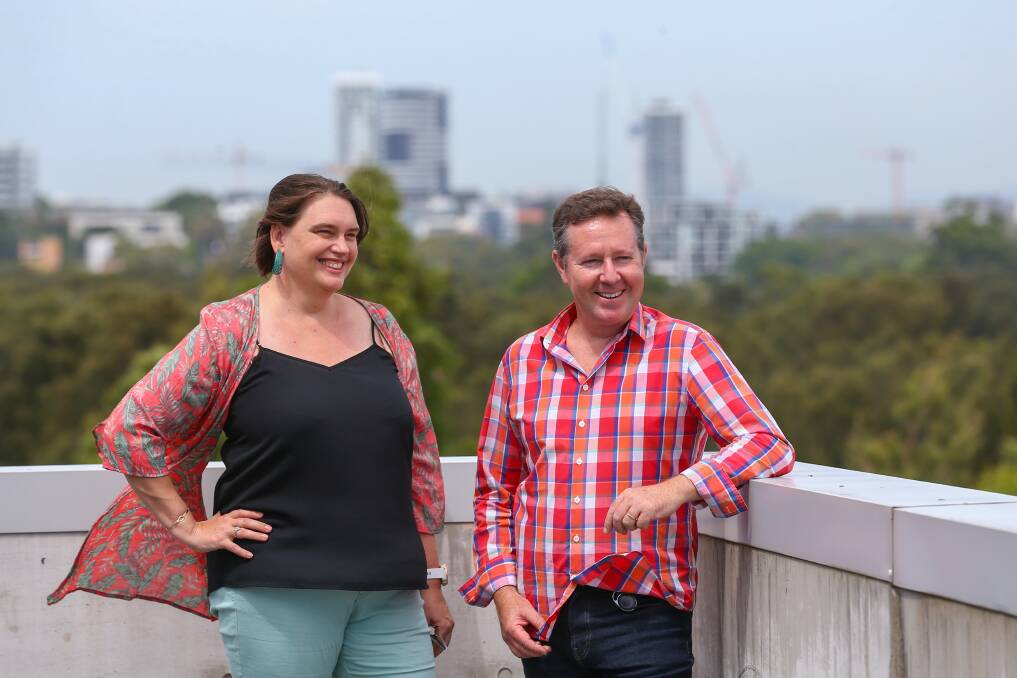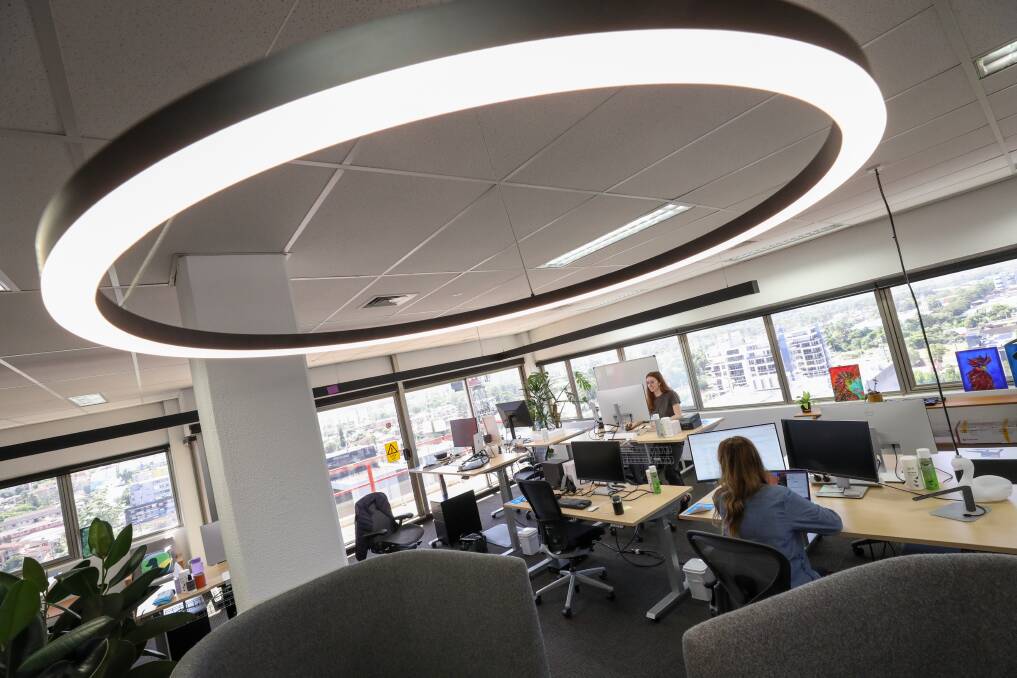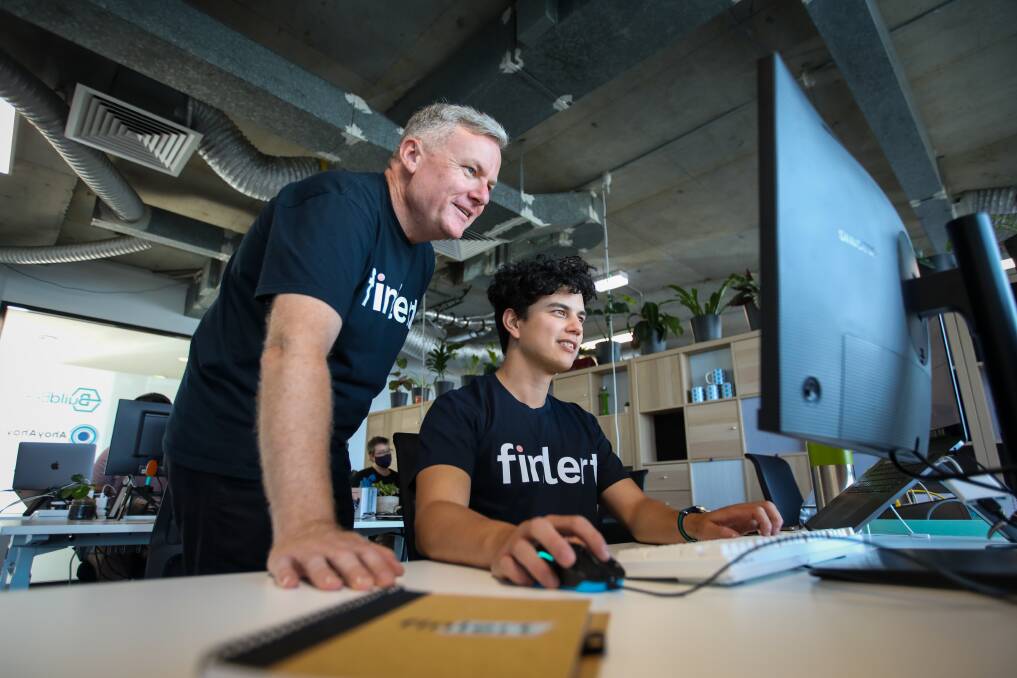
After living in San Francisco for four years, in 2015 tech worker Nick Muldoon decided that it was time to return to Australia.
Subscribe now for unlimited access.
or signup to continue reading
Along with his wife and young child, Mr Muldoon looked around the country for a place that had a similar culture to what his small family had enjoyed in the Bay Area.
"We ultimately settled on Wollongong. We used to go to the farmers market on a Saturday in San Francisco and here we had the Farmers Market on the Friday. And then we saw the Science Space and we thought that's similar to the Exploratorium in San Francisco."

Along with fellow Atlassian alumni Dave Elkan, Mr Muldoon began tech firm Easy Agile in late 2015 in Wollongong. The way Mr Muldoon describes it, Wollongong had the perfect balance between lifestyle and the opportunity for business development.
"The proximity to Sydney, the proximity to the university and the graduate talent here was appealing. But, if we were further south it probably would have been geographically impossible to attract and retain talent," Mr Muldoon said.
Easy Agile is not the only tech-focused startup to find in Wollongong the right blend of talent and lifestyle. A graduate of the University of Wollongong, rather than follow his peers to Sydney, Melbourne or overseas, Eamonn Bell decided to stay in Wollongong to start Accelo in 2009.
"When we started the company, it was a natural choice. This is where we live, we know that we can grow and hire people here and it's also just beautiful," Mr Bell said.
Nathan Harper has seen the growth of tech start ups like Easy Agile and Accelo from his base in Wollongong and knows what has made the city a hub for tech talent in the past decade.
"There's lots of really good tech resources, it can be a bit more affordable than being in Sydney or Melbourne. But primarily, it's not really about affordability, it's about just access to good people," Mr Harper said.
For some years, the few Wollongong based IT start ups had their pick of local talent. Many young graduates from the University of Wollongong saw the opportunity to get their foot in the door of a career without needing to move, working from Wollongong offered lifestyle benefits for those stuck in the grind of Sydney and for those who were based in Wollongong and commuting to Sydney, the opportunity to drop the hours spent commuting was too good to turn down.
This facilitated the growth of not just Easy Agile and Accelo, but a number of software start ups that provide services to clients based across the globe. However, when COVID arrived and firms shifted to working from home, the calculus changed. Notably, Australia's software success story Atlassian changed from requiring workers to meet in person at its office in Wynyard, to announcing 'Team Anywhere', allowing employees to work from wherever, for as long as they liked.
"Now there are people who are working for big companies in Sydney that would have never consider remote work who are all remote working," Mr Harper said. "That's changed the game plan because it's harder to get those people to switch over to a local organisation when they don't even have to leave home and work for Commonwealth Bank."
To address this, firms such as Easy Agile and Accelo have lent in to the fact that they are based in Wollongong and highlight the benefits of living here.
"We have to now position ourselves as an alternative to a venture funded tech company in Sydney, but we also have to position ourselves against tech companies anywhere in the world," Mr Muldoon said.
"It has required that we reevaluate what it means to be Easy Agile? And what's our value proposition for an employee?"
Beyond the location and lifestyle, however, there are aspects of being in Wollongong that are not available elsewhere. Tamantha Stutchbury, director of research at start up incubator iAccelerate, said that being in a smaller but dynamic setting is what sets Wollongong apart.
"In a big city it's often harder to connect to the person who has the answer. In this region, there's always someone willing to help out, to connect you, to give you advice. That actually makes the Illawarra a perfect space for start ups. It is very collegiate region that allows companies to stumble a little bit while they're growing, without it being the end of them."
To those who are here, that may be evident, but for those unfamiliar with Wollongong and the start up ecosystem here, there may be a perception that the region is stuck in old ways of working.
"There's definitely a perception, people know the steelworks," Mr Bell said. "It's taken some time, but people are recognising that Wollongong is more than just an industrial city."
When iAccelerate was founded, those perceptions were perhaps more true. Founded in 2011, the incubator formed at a time when the Illawarra was struggling. BlueScope had laid off nearly 1000 workers and the future did not look so bright for the region.
But in the intervening decade, iAccelerate has become a model of how the industrial region can retain its core, legacy institutions, while adding new businesses and sectors along the way.
"A lot of very skilled workers lost their job," Ms Stutchbury said. "But they created lots of small SMEs and now we have this amazingly skilled workforce, the knowledge base within the people that run small companies in this region is probably second to none."
Unlike other incubators, iAccelerate does not take an equity stake in businesses, meaning they are able to support them without needing a quick financial return, explained program manager John Kerr.
As the initial crop of start ups have matured and others have followed in their footsteps, part of iAccelerate's remit was to change the idea of what a start up could be. Rather than the stereotype of a male dominated, software-focused industry, half of the founders that have come through iAccelerate are female and enterprises work across fields as diverse as health and education.
"Our main aim is to create jobs and employment in the region. That's a big difference from 'Let's create the next best app,'" Mr Kerr said.
While lifestyle and access to talent may have lured starts up to Wollongong, what has led them to stay has been the growth of an ecosystem of similar businesses working in different fields.

This has been somewhat institutionalised in meetup groups such as Siligong Valley, which Mr Harper and Muldoon founded. Mr Harper, who has founded multiple tech businesses in Wollongong, sees these kinds of networks as the essential ingredient to sustaining such businesses.
"The key to a good startup community is collaboration and connections. In our business, we've got to build this connection to a new system from the US and we can find somebody in Wollongong who has already done that integration. We can just reach out to them and have a chat."
US entrepreneur, Martin Babinec, in his book, More Good Jobs, describes a split between magnet cities that attract talent, and talent exporting cities, where young people leave in search of other opportunities. To those involved in the start up community in Wollongong, the city has the opportunity to show other formerly industrial-heavy cities how to attract and retain talent, even as traditional industries employ fewer people.
To take the next step, and build on the successes the city has already had, two issues stand out. The first is funding.
Venture capital, the lifeblood of start ups as they grow from an idea to an enterprise, is often concentrated in large cities and existing tech hubs. To plant the seed of this in Wollongong, Mr Harper said that some of those involved in Siligong Valley have started to pool together funds.
"The idea is that we talk to people who are keen to start their business and need that initial seed investment in order to get going."
The second is tapping into the research and knowledge housed in the University of Wollongong. Unlike large corporations, start ups do not have access to research and development teams but as Ms Stutchbury points out, collaboration between researchers and entrepreneurs could solve this.
"The research is the evidence base for the companies that need to get investment. They really need to have proof of the efficacy or how it works. That's where research really comes into its own."
On a day to day basis, however, Mr Bell said there's no going past the value of a good cup of coffee.
"Sometimes people say there's too many cafes, I think more please. It helps Wollongong to become this metropolis of there's lots to do, and people want to stay here. It's the social side of things as well, it's not just work."
To read more stories, download the Illawarra Mercury news app in the Apple Store or Google Play.
Sign up for breaking news emails below ...


